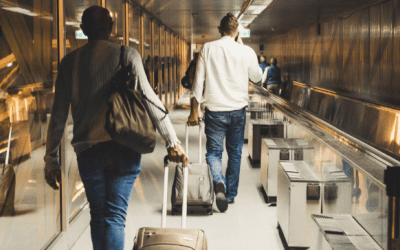The “Travel Technology Investment Trends” study by Amadeus reveals that 91% of travel companies expect to increase their technology investments moderately to aggressively in 2024. This increase is driven by the recognition that technology can significantly enhance operational efficiency and customer experience.
Expectations of Increased Technology Spending
Various subsectors, including airports, hotels, airlines, and travel agencies, anticipate a significant rise in their technology spending. On average, a 13% to 17% increase in technology investments is expected compared to 2023.
Areas with Highest Technological Investment Increase
In 2024, various subsectors within the travel industry are projecting significant increases in their technology investments. Below is a detailed overview of how and why they are focusing on specific areas.
- Airports are planning a +17.9% increase in average technology investment spending. They are focusing on implementing large-scale biometric technologies to enhance efficiency and security. Biometrics allow passengers to perform processes such as check-in, baggage delivery, VIP lounge access, and boarding through facial recognition or other forms of biometric identification. This reduces waiting times and streamlines passenger flow. In addition to biometrics, airports are investing in advanced security systems and technological solutions that optimize air and ground traffic management. These technologies help better manage resources and prevent potential incidents, thereby enhancing the overall passenger experience.
- Businesses plan a +15% increase in average technology investment spending. Businesses are focusing on digitizing key processes to increase efficiency and reduce costs. This includes adopting expense management software, online collaboration tools, and task automation platforms. Digitization enables greater transparency and control over expenses, facilitating more efficient resource management. Furthermore, technology solutions for expense and payment management are allowing businesses to optimize their workflows and improve accounting accuracy. Technologies such as payment orchestration and automated reimbursement systems help businesses better manage cash flows and reduce manual errors.
- Regarding hotels, a +14% increase in technology investments is planned. They are investing in technologies that enable personalized guest experiences. This includes customer relationship management (CRM) systems, data analytics, and artificial intelligence platforms that analyze guest preferences and behaviors to offer personalized recommendations and tailored services. Investments are also directed towards technologies that improve operational efficiency, such as advanced property management systems (PMS), mobile applications for service management, and automation solutions for inventory control and maintenance. These technologies help hotels operate more efficiently, reduce costs, and enhance guest experience.
- Airlines and travel agencies will increase their average technology investment spending by +13% for 2024. Airlines are adopting modern retailing strategies, transitioning to “Offer & Order” models. These strategies enable airlines to offer personalized products and services based on passenger preferences, enhancing customer satisfaction and generating new revenue streams. Additionally, travel agencies are focused on implementing the New Distribution Capability (NDC), a technology that allows airlines and travel agencies to offer richer and more personalized content. NDC facilitates the sale of ancillary services and customization of the purchasing experience, enhancing the competitiveness of travel agencies. Moreover, to improve transaction efficiency and security, travel agencies are investing in payment orchestration, a technology that optimizes the global payment process, reduces costs, and enhances the customer experience by providing more convenient and secure payment methods.
These investments reflect a clear trend towards adopting advanced technologies that not only improve operational efficiency but also elevate the customer experience across all aspects of travel.

Priority Technologies
The travel sector is focusing on several key technologies to enhance operational efficiency and customer experience. These technologies optimize internal processes and enable more personalized and secure services. As we move towards 2029, some of these technologies will remain crucial, while emerging ones will begin to have a significant impact on the industry.
In the current year, 2024, priority technologies include:
- Machine Learning: Machine learning is transforming the travel industry by improving internal processes and customizing services for customers. This technology helps companies analyze large volumes of data and make informed decisions, offering more personalized and efficient experiences.
- Data Analytics: The use of big data is crucial for better understanding customer needs and behaviors. Companies can use this data to optimize operations, improve efficiency, and offer products and services more aligned with travelers’ preferences.
- Digital Payments: Facilitating secure and fast transactions is essential in the travel sector. Digital payments, including e-wallets and mobile payment solutions, are on the rise, providing convenience and security for both customers and businesses.
- Digitalization: Transforming traditional processes to digital is allowing travel companies to operate more efficiently and effectively. This includes digitizing reservation management, check-ins, and other travel-related services.
- Cloud Computing: Storing and processing data in the cloud allows travel companies to handle large volumes of information more efficiently, improving responsiveness and service availability in real-time.
Looking towards the near future in 2029, some of these technologies will continue to be considered key in terms of technological investment. Among them are machine learning, digital payments, and data analytics. However, generative artificial intelligence promises to revolutionize the creation of personalized content and services. This technology can generate everything from travel itineraries to activity recommendations based on individual traveler preferences.
Innovations in Traveler Experience
In a rapidly advancing technological world, the travel sector is adopting innovations that transform the traveler experience. From smart retailing to extended reality, these technologies are designed to enhance efficiency, safety, and customization of services offered to customers. This section explores some of the main technological innovations that are redefining how we travel, making it more convenient and enjoyable.
Smart Retailing
Smart retailing uses advanced technologies to offer personalized products and services during travel. For example, through data analysis and machine learning, airlines can suggest additional services such as seat upgrades, special meals, or entertainment packages based on passenger preferences. This customization not only improves the customer experience but also generates additional revenue for companies.
Digital Efficiency
Implementing digital solutions is crucial to optimizing processes and reducing waiting times. Airports and airlines are adopting technologies such as mobile check-in, real-time baggage tracking, and automated security control systems to streamline passenger flow. These advances not only improve operational efficiency but also reduce stress and waiting times for travelers.
Extended Reality
Extended reality (XR), including virtual reality (VR) and augmented reality (AR), is transforming the traveler experience. A notable example is the Amadeus Lounge, a virtual room created in collaboration with Accenture. This platform allows travelers to explore destinations, visualize hotel rooms, and plan itineraries in an immersive environment. XR offers an interactive experience that can make travel planning more engaging and personalized.
These innovations are redefining how travelers interact with travel services, making the process more efficient, secure, and personalized. As technology continues to advance, we can expect to see further improvements in the traveler experience.






